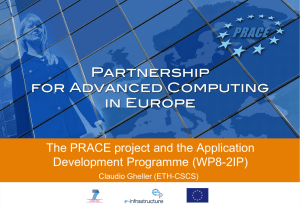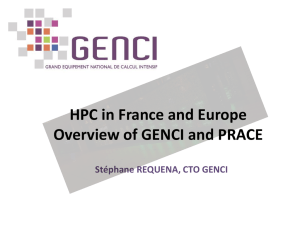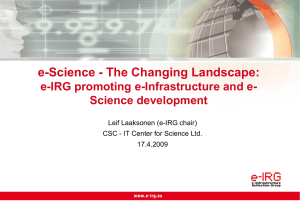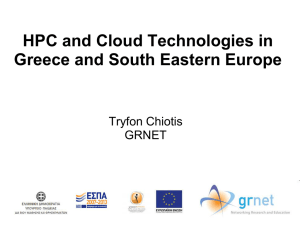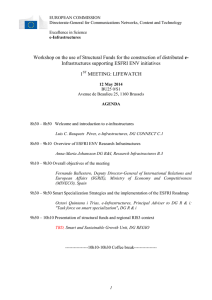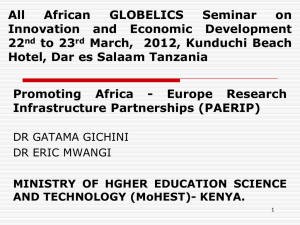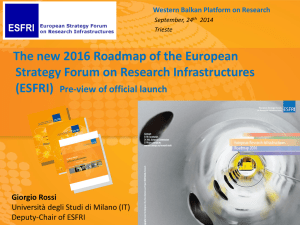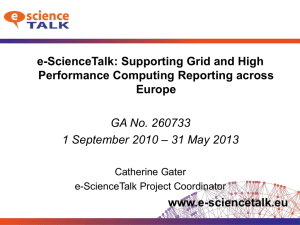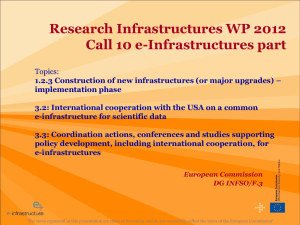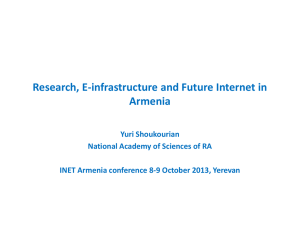e-Infrastructure Commons White Paper 2013
advertisement
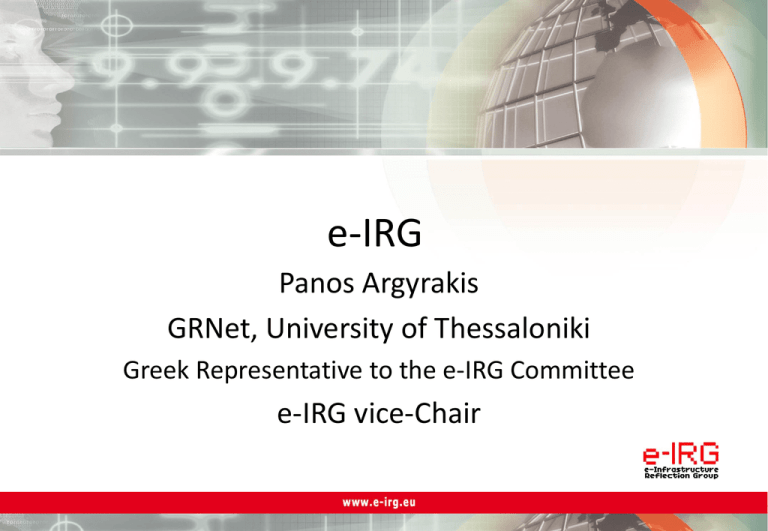
e-IRG Panos Argyrakis GRNet, University of Thessaloniki Greek Representative to the e-IRG Committee e-IRG vice-Chair e-IRG is the ESFRI of computers but has UNIQUE character because there are computational needs in all 48 ESFRI projects The e-Infrastructure Reflection Group Founded to provide strategic advice and guidance on the development of European e-infrastructure for science and research to: •EC, MS governments, ESFRI, national funding agencies •Policy-makers on the (inter-)governmental level •e-Infrastructure service-providers •Research networks, computing centers, projects •User communities and research infrastructures •ESFRI projects, data infrastructures •Technology developers and industry The e-Infrastructure Reflection Group • Delegates appointed by ministries – represents nations (EU member states and associated states + EC). • Bylaws: www.e-irg.eu/images/stories/about-e-irg/ e-irg_bylaws_120914-approved.pdf • First meeting (in Athens) June 2003 • Four delegates meetings and two open workshops each year • Analyses the future foundations of the European Knowledge Society, and produces roadmaps, white papers and task-force reports including recommendations • Secretariat: Provided by support projects, currently e-IRGSP4 (~ 6-8 partners, GR is one of them) e-Infrastructure •networking •high-throughput •high-performance computing •data infrastructures •software •authentication and authorization and •tools and services for international virtual research communities Note the wide scope: e-Infrastructure supports research (all types) and other research infrastructures (all types) The e-Infrastructure Commons Roadmap 2012: Outlines Europe’s need for a single e-Infrastructure Commons White Paper 2013: Further discussion and recommendations Dublin May 2013 – issues in the WP discussed at open workshop • European services on data • Coordination of e-Infrastructures July 2013 – Final version of WP accepted PRACE History HPC part of the ESFRI Roadmap; creation of a vision involving 15 European countries Creation of the Scientific Case HPCEUR 2004 2005 http://www.imdb.com/title/tt1615147/ Signature of the MoU Creation of the PRACE Research Infrastructure HET 2006 PRACE Initiative 2007 PRACE RI 2008 2009 2010 2011 2012 2013 2014 PRACE Preparatory PRACE-3IP PRACE-1IP Phase Project PRACE-2IP PRACE the European HPC Research Infrastructure Enabling world-class science through large scale simulations Providing HPC services on leading edge capability systems Operating as a single entity to give access to world-class supercomputers Attract, train and retain competences Lead the integration of a highly effective HPC ecosystem Offering its resources through a single and fair pan-European peer review process to academia and industry Legal entity (AISBL) PRACE with seat location in Brussels 25 PRACE Members • • • • • • • • • • • • • • • • • • • Austria: JKU - Johannes Kepler University of Linz Belgium: DGO6-SPW – Service Public de Wallonie Bulgaria: NCSA - Executive agency Cyprus: CaSToRC –The Cyprus Institute Czech Republic: VŠB - Technical University of Ostrava Denmark: DCSC - Danish Center for Scientific Computing Finland: CSC - IT Center for Science Ltd. France: GENCI - Grand Equipement National de Calcul Intensif Germany: GCS - GAUSS Centre for Supercomputing e.V Greece: GRNET - Greek Research and Technology Network S.A. Hungary: NIIFI - National Information Infrastructure Development Institute Ireland: ICHEC - Irish Centre for High-End Computing Israel: IUCC - Inter-University Computation Center Italy: CINECA - Consorzio Interuniversitario Norway: SIGMA – UNINETT Sigma AS – The Netherlands: SURFSARA: SARA Computing and Networking Services Poland: PSNC – Instytut Chemii Bioorganicznej Pan Portugal: FCTUC – Faculdade Ciencias e Tecnologia da Universidade de Coimbra Slovakia: Computing Center of the Slovak Academy of Science • Slovenia: ULFME - University of Ljubljana, Faculty of Mechanical Engineering • • • • • Spain: BSC – Barcelona Supercomputing Center – Centro Nacional de Supercomputación Sweden: SNIC – Vetenskapsrådet – Swedish Research Council Switzerland: ETH – Eidgenössische Technische Hochschule Zürich Turkey: UYBHM – Ulusal Yuksek Basarimli Hesaplama Merkezi, UK: EPSRC – The Engineering and Physical Sciences Research Council 67+ Million € from EC FP7 for preparatory and implementation Grants INFSO-RI-211528, 261557, and 283493 Complemented by ~ 50 Million € from PRACE members Tier-0 Petaflop-Capability in PRACE BlueGene/Q 5.87 Petaflop/s PRACE@GCS@Jülich CRAY HORNET 4 Petaflop/s PRACE@GCS@HLRS Bull Cluster Curie 1.8 Petaflop/s PRACE@GENCI@CEA IBM SuperMUC 3 Petaflop/s PRACE@GCS@LRZ BlueGene/Q 1 Petaflop/s PRACE@CINECA MareNostrum 1 Petaflop/s PRACE@BSC e-IRG ESFRI Overarching Working Group (OWG) • Established April 1, 2014 • e-IRG representatives in ESFRI WGs (SWG, Implementation, Innovation) + ESFRI representative invited + e-IRG Chair • Aim: bring the e-IRG participants in the SWGs together to aggregate the information received individually thus obtaining a more overall view of ESFRI’s e-Infrastructure requirements. This can facilitate identifying generic issues and prioritising possible eIRG actions, and aggregated information can also be offered as input to ESFRI processes. • Life span: As long as needed e-IRG White Paper 2014 • Editorial board appointed April 1, 2014: e-IRG ESFRI OWG • Aim: Produce recommendations on issues emerging in the OWG – in the framework of the developing e-Infrastructure Commons • List of topics and preparatory material presented and discussed at e-IRG workshop and delegates meeting in June 2014 • White Paper ready by the end of 2014 • Strong ties and collaboration between ESFRI and e-IRG Thank you! www.e-irg.eu
